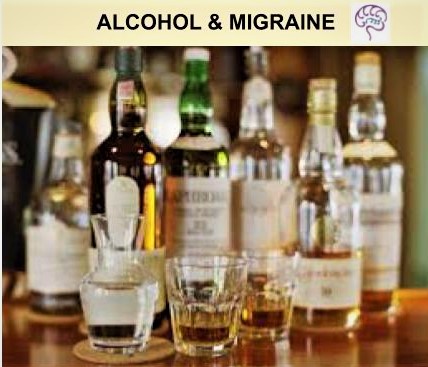
Alcohol is a fairly common reported trigger for migraines. Because each individual is unique it may not cause migraines in some people. Compared to the general public, people with a history of migraines consume less alcohol.
Alcohol has been known to cause headaches within a few hours of ingesting or more delayed, such as the next day “hangover” headache. Known as the delayed alcohol-induced headache, it’s onset usually occurs within 12 -24 hours of alcohol ingestion. The migraine may be provoked by small quantities of alcohol.
Current research supporting the link between alcohol and migraines is weak. However, one study found an increase in the number of migraines in study participants with reported sensitivity to red wine when given red wine versus vodka. Other studies in Italy and France have found that ingestion of white wine is associated with migraines. It is theorized that alcohol sets off a cascade causing dilation of blood vessels or changes in the level of a neurotransmitter called serotonin leading to headache.
It has been theorized that other components of alcohol tyramine, phenylethylamine, histamine, sulfites, flavonoid phenols may be triggers. Specifically, histamine which is present in wine as well as foods such as fish, aged cheese, aged meats such as salami or sausage, and some vegetables. Additionally, histamine release in the body may be triggered by these foods and alcoholic beverages however compounds called sulfites. Another component called sulfites which is found in wine as well as soy sauce, pickles, raisins, and other dried fruit may trigger migraines. A substance called tyramine which is found in aged cheese and most meats and fermented foods has been the most widely studied of the alcohol-related components although results of the studies has shown no correlation. In fact, it has been found that the amount found in food far surpasses the amount found in wine or alcohol.
Additionally, the byproducts of alcohol fermentation or congeners such as phenols and tannins, which give alcohol and wine unique flavor profile have often been associated with migraine, however, scientific research does not support this. Generally, the darker the alcoholic spirit, the higher the amount of congeners. It is often reported that darker spirits such as whisky trigger migraines more frequently than lighter ones, but the research is limited.
It is likely that the migraine may be caused or triggered by multiple factors. To help manage your alcohol-induced migraines, it may be helpful to keep a headache diary and note specific alcohol consumption including type and quantity of alcohol, foods eaten, and other factors (including increased stress levels and weather).
The best advice regarding alcohol in people with migraines applies to everyone- it is best to drink in moderation.
If you feel you have a drinking problem, call the Substance Abuse and Mental Health Services Administration 24/7 hotline for a free and confidential referral for help at 1-800-662-4357.
By Brooke Steiger, NP
